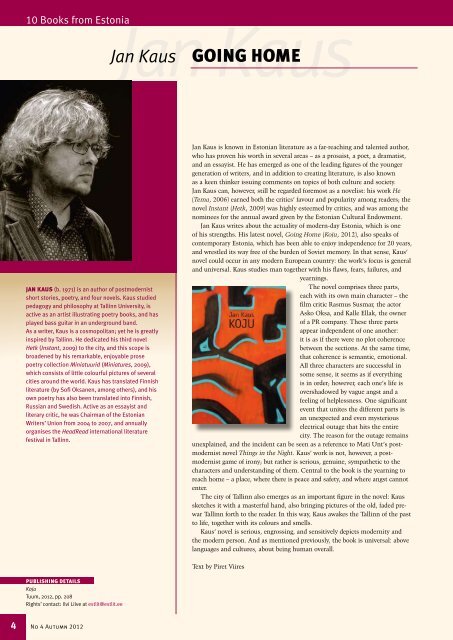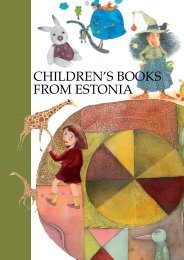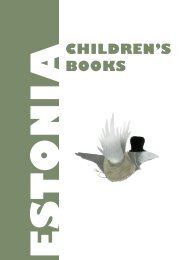No 4 Autumn 2012 - Estonian Literature
No 4 Autumn 2012 - Estonian Literature
No 4 Autumn 2012 - Estonian Literature
Create successful ePaper yourself
Turn your PDF publications into a flip-book with our unique Google optimized e-Paper software.
4<br />
10 Books from Estonia<br />
Jan kaus (b. 1971) is an author of postmodernist<br />
short stories, poetry, and four novels. Kaus studied<br />
pedagogy and philosophy at Tallinn University, is<br />
active as an artist illustrating poetry books, and has<br />
played bass guitar in an underground band.<br />
As a writer, Kaus is a cosmopolitan; yet he is greatly<br />
inspired by Tallinn. He dedicated his third novel<br />
Hetk (Instant, 2009) to the city, and this scope is<br />
broadened by his remarkable, enjoyable prose<br />
poetry collection Miniatuurid (Miniatures, 2009),<br />
which consists of little colourful pictures of several<br />
cities around the world. Kaus has translated Finnish<br />
literature (by Sofi Oksanen, among others), and his<br />
own poetry has also been translated into Finnish,<br />
Russian and Swedish. Active as an essayist and<br />
literary critic, he was Chairman of the <strong>Estonian</strong><br />
Writers’ Union from 2004 to 2007, and annually<br />
organises the HeadRead international literature<br />
festival in Tallinn.<br />
Publishing deTails<br />
Koju<br />
Tuum, <strong>2012</strong>, pp. 208<br />
Rights’ contact: Ilvi Liive at estlit@estlit.ee<br />
<strong>No</strong> 4 <strong>Autumn</strong> <strong>2012</strong><br />
Jan Kaus<br />
Jan Kaus going home<br />
Jan Kaus is known in <strong>Estonian</strong> literature as a far-reaching and talented author,<br />
who has proven his worth in several areas – as a prosaist, a poet, a dramatist,<br />
and an essayist. He has emerged as one of the leading figures of the younger<br />
generation of writers, and in addition to creating literature, is also known<br />
as a keen thinker issuing comments on topics of both culture and society.<br />
Jan Kaus can, however, still be regarded foremost as a novelist: his work He<br />
(Tema, 2006) earned both the critics’ favour and popularity among readers; the<br />
novel Instant (Hetk, 2009) was highly esteemed by critics, and was among the<br />
nominees for the annual award given by the <strong>Estonian</strong> Cultural Endowment.<br />
Jan Kaus writes about the actuality of modern-day Estonia, which is one<br />
of his strengths. His latest novel, Going Home (Koju, <strong>2012</strong>), also speaks of<br />
contemporary Estonia, which has been able to enjoy independence for 20 years,<br />
and wrestled its way free of the burden of Soviet memory. In that sense, Kaus’<br />
novel could occur in any modern European country: the work’s focus is general<br />
and universal. Kaus studies man together with his flaws, fears, failures, and<br />
yearnings.<br />
The novel comprises three parts,<br />
each with its own main character – the<br />
film critic Rasmus Susmar, the actor<br />
Asko Oksa, and Kalle Ellak, the owner<br />
of a PR company. These three parts<br />
appear independent of one another:<br />
it is as if there were no plot coherence<br />
between the sections. At the same time,<br />
that coherence is semantic, emotional.<br />
All three characters are successful in<br />
some sense, it seems as if everything<br />
is in order; however, each one’s life is<br />
overshadowed by vague angst and a<br />
feeling of helplessness. One significant<br />
event that unites the different parts is<br />
an unexpected and even mysterious<br />
electrical outage that hits the entire<br />
city. The reason for the outage remains<br />
unexplained, and the incident can be seen as a reference to Mati Unt’s postmodernist<br />
novel Things in the Night. Kaus’ work is not, however, a postmodernist<br />
game of irony; but rather is serious, genuine, sympathetic to the<br />
characters and understanding of them. Central to the book is the yearning to<br />
reach home – a place, where there is peace and safety, and where angst cannot<br />
enter.<br />
The city of Tallinn also emerges as an important figure in the novel: Kaus<br />
sketches it with a masterful hand, also bringing pictures of the old, faded prewar<br />
Tallinn forth to the reader. In this way, Kaus awakes the Tallinn of the past<br />
to life, together with its colours and smells.<br />
Kaus’ novel is serious, engrossing, and sensitively depicts modernity and<br />
the modern person. And as mentioned previously, the book is universal: above<br />
languages and cultures, about being human overall.<br />
Text by Piret Viires







